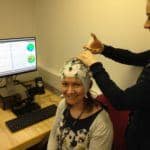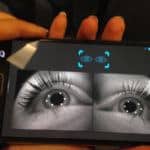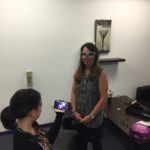Profile
Lizzie Bradford
-
About Me:
I live in Edinburgh, Scotland. I’m a psychologist and researcher by day, and in the evenings and at weekends I love spending time with my awesome dog, Dexter, having adventures out and about! I also really love chocolate. Like, really love chocolate.
-
Read more
I am originally from Essex, but when I moved to Scotland to study, I fell in love with Scotland itself, and decided it was where I wanted to be based! I like to go and visit my family who are still in Essex and the surrounding areas as often as I can. Dexter and I like to get out and about at the weekends, exploring the beautiful places Scotland has to offer. I also enjoy baking, reading, and watching netflix.
-
My pronouns are:
She/her.
-
My Work:
I am a Researcher and Lecturer in Social Cognitive Neuroscience and Psychology. As part of these roles, I teach students, supervise research projects, as well as conducting my own experimental research, focused on social communication abilities (sometimes referred to as ‘mind-reading’ abilities!).
-
Read more
Some people say that I study ‘mind-reading’! What this really means is that my research and work focuses on trying to understand how we are able to think about things from some one else’s point of view (for example, if we say something rude to our friend, understanding how that will make them feel, even if they don’t tell us directly), and how we ‘mind-read’ in order to understand other people’s thoughts, feelings, and perspectives. This is sometimes called ‘Theory of Mind’, and refers to how well we can process and consider the perspectives of other people.
We use these Theory of Mind abilities to allow us to communicate successfully, and I am interested in how and why sometimes this may go wrong. We all have moments where we misunderstand someone, or they misunderstand what we have said. I am interested in why this happens, and how we are able to over come it when it does happen.
To study this, we use tasks and different measures (such as computerised games) that look at how well (quickly and accurately) people can identify another person’s visual perspective (what they can or cannot see), their emotions, and how people may be feeling. We also look at brain activity that predicts success in these tasks (EEG), and use eye-tracking to study what people look at when trying to understand other people’s perspectives.
-
My Typical Day:
First thing in the morning, I take my dog Dexter out for a nice walk, before coming home for breakfast. I start work at 8:30am, where I will be either conducting studies in the lab, or preparing studies at my computer. On some days I also teach psychology courses (those are always busy days!). I have lunch at about 1pm, before taking Dexter out for a short walk again. In the afternoon, I sit back at my desk, answer emails, carry on with my research projects, meet with students to chat about their studies, and attend journal clubs, where we discuss latest research findings. I finish work at 5pm, and have a nice chilled evening ahead.
-
Read more
Although a typical day is broadly like I describe above, one of the things I love about being a researcher is that everyday can be very different. Some days it is a lot of paperwork – reading about the latest research, finding out what other people have been researching, marking student work, and writing reports. Other days it can be very active, working with participants, with students, and research assistants. It keeps things interesting to move between these different roles!
-
What I'd do with the prize money:
I love conducting psychology research, as I am very interested in the human mind – why do we do things the way we do? Why do we say things that may upset another person sometimes? One problem that many psychology researchers face is that some people are a bit worried when they hear that we are psychologists – some people worry that means we are analysing everything they do, or can read their thoughts. This is not true! It’s really important that some of our studies are able to be conducted with members of the public (rather than just psychology students), to allow us to see how different people experience and process different things. If I was awarded this prize money, I would use it to host an interactive open day where we are able to show members of the public different types of studies and approaches used in psychological research, to try and remove the stigma or concern associated with them. The event would show how we collect data, what we then do with it, and what previous results have shown. This would involve hands on experience of different research tasks, eye-tracking trials, and a demonstration of EEG. My hope is that an event like this would encourage non-psychology individuals to take part in future research studies, with reassurance about what happens in psychology studies!
-
Education:
I was born in Essex, where my family still live. I went to a local primary school, followed by attending St Bernards Catholic High School, in Westcliff, Essex. After that, I went to the University of Kent to study for my undergraduate degree in Psychology. I then took a year out working, before moving to Scotland to study for my MSc in Evolutionary and Comparative Psychology (learning all about non-human apes, like chimpanzees!), and stayed on to complete my PhD in Cognitive Psychology.
-
Qualifications:
I missed a lot of my secondary school education due to illness, so I ended up with just 5 GCSEs (Maths, Double English, and Double Science). I went on to study for my A-Levels (Psychology, Sociology, and English), before starting my undergraduate degree in Psychology at the University of Kent. I then took a year out working before returning for more studies: I completed an MSc in Evolutionary and Comparative Psychology, followed by a PhD in Cognitive Psychology at the University of St Andrews, Scotland.
-
Work History:
After finishing my undergraduate Psychology degree, I spent a year working in London for a film distribution company. I had lots of fun, but realised it wasn’t the right path for me, so returned to studies by. moving up to Scotland for my MSc. After that, I knew I wanted to do a PhD, but needed to take some time off to sort funding for it. In that year, I worked at the University Library to make ends meet, before starting my PhD studies.
Since completing my PhD, I worked as a post-doctoral research assistant at the University of Kent for 4 years, where I got to spend all my time doing research and working with members of the public. I loved it! I then worked at the University of Dundee as a lecturer for a few years. I joined the University of St Andrews as a Lecturer in Social Cognitive Neuroscience in September 2025.
-
Current Job:
I currently work as a Lecturer in Social Cognitive Neuroscience at the University of St Andrews.
-
Employer:
I work at the University of St Andrews, in Scotland.
-
My Interview
-
How would you describe yourself in 3 words?
I am a chocolate and dog-loving psychologist!
What did you want to be after you left school?
I wanted to work in the film industry! I tried it out for a year, but decided it wasn't for me after all, so headed back to University to carry on studying.
Were you ever in trouble at school?
Just once! I was talking in class when I shouldn't have been (I didn't hear the teacher call us to attention, I promise!). I got a detention, but that was my only one :D
If you weren't doing this job, what would you choose instead?
I think, if I was not doing this job, I would open a little bookshop with a bakery and cafe attached. My dog could hang out there with me, and I think it could be fun!
Who is your favourite singer or band?
At the moment, it's Taylor Swift, but it changes often!
What's your favourite food?
Chocolate!
If you had 3 wishes for yourself what would they be? - be honest!
I really wish I could time travel, I would love to see the world at different points in history! I also think it would be great fun to be able to fly. I think a lifetime supply of chocolate would also be a great wish...
Tell us a joke.
Why was nine scared of seven? Because seven eight nine.
-









